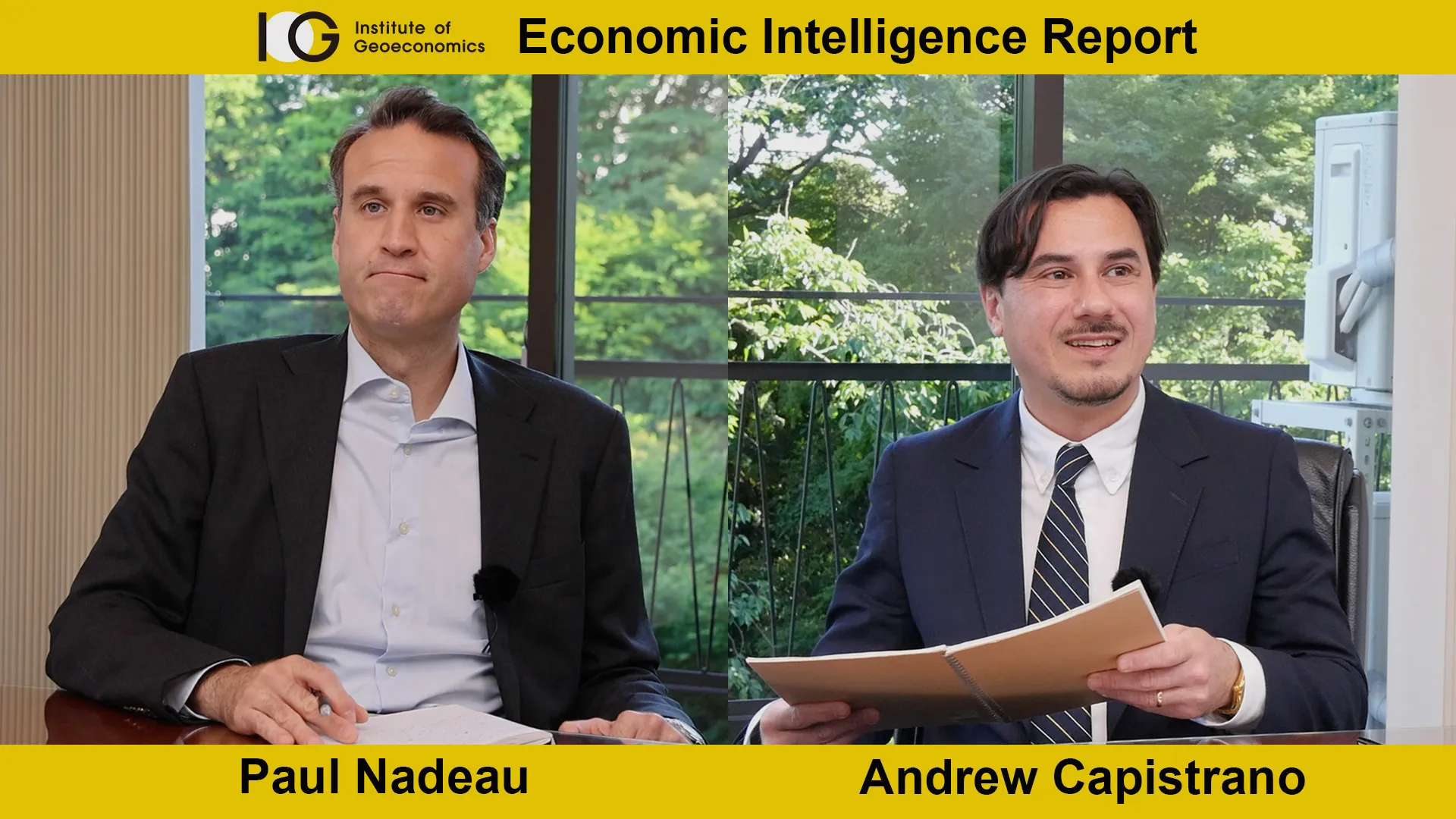IOG Economic Intelligence Report (Vol. 3 No. 7)

The latest regulatory developments on economic security & geoeconomics
European Parliament Passes Comprehensive AI Legislation: The European Union (EU) Parliament passed the Artificial Intelligence Act on March 13, the first binding and comprehensive effort address the risks from AI technologies. The legislation classifies AI products by their level of risk and applies scrutiny accordingly, with “higher risk” products, such as those associated with critical infrastructure, education, healthcare, law enforcement, border management or elections facing stricter rules. Products that pose a “clear risk to fundamental rights”, like those which process biometric data, will be banned entirely. It also requires generative AI systems, like ChatGPT, to comply with EU copyright rules and for transparency about the material used to train their models.
EU Passes Legislation on Supply Chain Oversight: EU countries passed a scaled-down version of legislation to provide for oversight of human rights and environmental concerns in supply chains. Under the law, which would take effect in 2028, EU companies would have to audit their supply chains and take corrective action if their audits reveal human rights abuses or environmental harm. The revised rules reduce the number of companies covered under the legislation by increasing the threshold for the number of employees (to 1000 employes, up from 500) and by raising the net turnover to €450 million.
Commerce Department Recommends AI Audits: The U.S. Commerce Department’s National Telecommunications and Information Administration issued a report on March 27 that recommends a system of audits for artificial intelligence systems that would hold firms accountable for risks and damage from AI systems. The report also recommends support for the U.S. AI Safety Institute at the National Institutes of Standards and Technology to work with companies and interest groups on the development and design of such audits as well as creating liability standards.
Legislation to Follow: Senators Joe Manchin (D-WV), Catherine Cortez Masto (D-NV), Marsha Blackburn (R-TN), and Shelley Moore Capito (R-WV) have introduced the Securing America’s Titanium Manufacturing Act. The bill would remove the 15 percent tariff on titanium sponge imports for countries with preferential trade status until 2031, like Japan, while still applying the tariffs on imports from Belarus, Cuba, North Korea and Russia.
Meanwhile, Senators Sherrod Brown (D-OH), Mitt Romney (R-UT), John Cornyn (R-TX), James Langford (R-OK), Catherine Cortez Masto (D-NV), and Todd Young (R-IN) have introduced the American Economic Independence Act which would require the President to submit a “comprehensive threat analysis” of national security risks posed by economic integration with China. The legislation would specifically focus on risks to financial services, artificial intelligence, critical minerals and rare earths, semiconductors, quantum computing, cloud services, communications, biotech, pharmaceuticals, and manufacturing.
Analysis: What’s Driving the Nippon Steel Backlash?
“Shogun” is on tv, everyone’s talking about “Dune”, the United States and Russia are engaged in a proxy war, and members of Congress are furious about the possible takeover of a beloved American brand by a Japanese company. You’d be forgiven for thinking that we’re back in the 80s, but this is very much 2024 because those are all remakes of the 80s originals.
While it’s not as severe as a land war in Europe, the economic nationalism from U.S. leaders is still concerning and has implications for the entire global system. The most recent instance is the reaction to Nippon Steel’s proposed acquisition of U.S. Steel which has drawn opposition from the senators representing some of the states U.S. Steel is located all the way up to President Biden. Members of Congress haven’t started taking baseball bats to Nippon Steel products in front of the U.S. Capitol the way they did with Toyota cars in the 80s, but it feels like it might not be far off.
It’s understandably hard for outsiders to make sense of it. It might be an election year with many close races, particularly in the states where U.S. Steel is concentrated, but between the sale’s announcement in December 2023 and Election Day in November, any number of issues could tip the balance. The U.S. steel industry only employes 80,000 and U.S. Steel itself has roughly 20,000 workers. In terms of the national security rationale, where regulators have the purview to block the sale, the steel produced is mostly for the automotive industry while there are already foreign firms producing steel for the U.S. Navy. Issues with the union could be overcome through negotiations while the future of Nippon Steel’s operations in China are easy to solve and not the sort of thing that would block a CFIUS approval. U.S. Steel badly needs the investment that Nippon Steel is offering, and Nippon Steel is paying far more than the competing offer.
Of course, it’s not just this instance where the United States has frustrated a world looking for it to engage economically. Ohio Senator Sherrod Brown almost single-handedly got the Biden administration to pull back the trade pillar of the Indo-Pacific Economic Framework (IPEF), the Biden administration’s next-best attempt at economic engagement with the region after TPP became a nonstarter for U.S. participation. It’s not just Democrats, either – Robert Lighthizer, Trump’s U.S. Trade Representative, recently made the case in The Economist for “economic, geopolitical and moral reasons to increase protectionism”. But the vehemency of the response and weak rationale for those objections make the Nippon Steel situation a particularly stark case.
An obvious conclusion is that this is a structural shift rather than a run of isolated cases, that both Democrats and Republicans have turned their back on international economic engagement, but the reality is a little more nuanced. It’s true that their objections seem similar, but those objections also come from different places – Biden and Democrats are driven foremost by concerns about impact of foreign trade and investment on U.S. jobs but remain (at least superficially) interested in international economic engagement; Trump and Republicans combine their concerns with domestic jobs with a more fundamental skepticism of foreign engagement. This is a key difference because Republicans seem to genuinely believe in their core that trade is impoverishing, as seen in their perspective on trade deficits or in Ohio Senator J.D. Vance’s book Hillbilly Elegy and its portrayal of a “working-class middle America” that’s been forsaken by “coastal elites”. Democrats, already driven by historic support from trade-skeptical unions, have convinced themselves that economic protection is the only way to be politically competitive in these states, effectively combining the party’s existing trade skepticism with overlearning the lessons of the 2016 election and a broader risk aversion across many issues, not just trade.
It might also be a distinction without a difference because whatever the rationale for staying on the sidelines, the result is the same. Even if the Biden administration could theoretically engage in economic multilateralism more than a future Republican administration, the bar that they’ve set for participation is so high as to be unreachable, at least so far. It might be less triumphantly protectionist than a Trump administration, but if the outcome is the same then it’s hard for the region to take much solace.
There’s a further unsettling difference between the trade fights of the 80s and what’s happening today. Protectionism and economic nationalism aren’t new in the history of U.S. trade policy (if anything, it’s liberalization that’s the exception) and there were high-profile cases of protectionism under the postwar order. What makes the past disputes different is the fact that decisionmakers started from a premise that the world should be open, and even if there were steps to respond to shocks or accommodate vulnerable industries, the fundamental preference for an open system was in the background. This time, the preference is to accommodate any vulnerable industry and believe that shocks are inevitable, and while this might be the most politically viable choice, it also does harm to U.S. partnerships and holds back the U.S. economy in the long run. While the rest of the world is trying to write new rules of the road, the world’s largest economy and the fulcrum of the liberal economic order is stuck creating remakes of the 80s.
Disclaimer: The views expressed in this IOG Economic Intelligence Report do not necessarily reflect those of the API, the Institute of Geoeconomics (IOG) or any other organizations to which the author belongs.
API/IOG English Newsletter
Edited by Paul Nadeau, the newsletter will monthly keep up to date on geoeconomic agenda, IOG Intelligencce report, geoeconomics briefings, IOG geoeconomic insights, new publications, events, research activities, media coverage, and more.


Visiting Research Fellow
Paul Nadeau is an adjunct assistant professor at Temple University's Japan campus, co-founder & editor of Tokyo Review, and an adjunct fellow with the Scholl Chair in International Business at the Center for Strategic and International Studies (CSIS). He was previously a private secretary with the Japanese Diet and as a member of the foreign affairs and trade staff of Senator Olympia Snowe. He holds a B.A. from the George Washington University, an M.A. in law and diplomacy from the Fletcher School at Tufts University, and a PhD from the University of Tokyo's Graduate School of Public Policy. His research focuses on the intersection of domestic and international politics, with specific focuses on political partisanship and international trade policy. His commentary has appeared on BBC News, New York Times, Nikkei Asian Review, Japan Times, and more.
View Profile-
 Fed-Treasury Coordination as Economic Security Policy2026.02.13
Fed-Treasury Coordination as Economic Security Policy2026.02.13 -
 Challenges for Japan During the U.S.-China ‘Truce’2026.02.12
Challenges for Japan During the U.S.-China ‘Truce’2026.02.12 -
 India and EU Sign Mother of All Deals2026.02.09
India and EU Sign Mother of All Deals2026.02.09 -
 Orbán in the Public Eye: Anti-Ukraine Argument for Delegitimising Brussels2026.02.04
Orbán in the Public Eye: Anti-Ukraine Argument for Delegitimising Brussels2026.02.04 -
 Trump, Takaichi and Japan’s Strategic Crossroads2026.02.03
Trump, Takaichi and Japan’s Strategic Crossroads2026.02.03
 Oil, Debt, and Dollars: The Geoeconomics of Venezuela2026.01.07
Oil, Debt, and Dollars: The Geoeconomics of Venezuela2026.01.07 Orbán in the Public Eye: Anti-Ukraine Argument for Delegitimising Brussels2026.02.04
Orbán in the Public Eye: Anti-Ukraine Argument for Delegitimising Brussels2026.02.04 When Is a Tariff Threat Not a Tariff Threat?2026.01.29
When Is a Tariff Threat Not a Tariff Threat?2026.01.29 It’s Now or Never: India’s Ambitious Reform Push2026.01.09
It’s Now or Never: India’s Ambitious Reform Push2026.01.09 A Looming Crisis in U.S. Science and Technology: The Case of NASA’s Science Budget2025.10.08
A Looming Crisis in U.S. Science and Technology: The Case of NASA’s Science Budget2025.10.08













